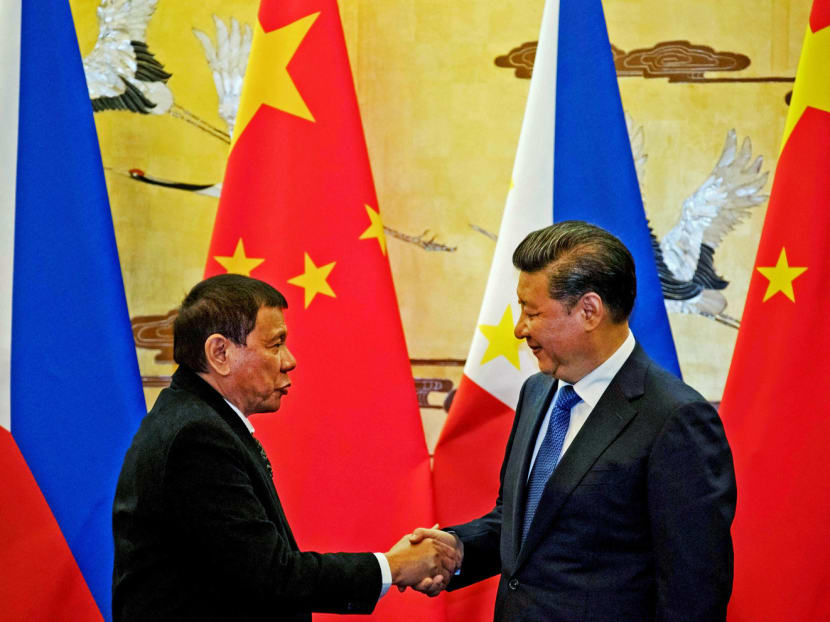Duterte announces ‘separation’ from US, realigns with China
BEIJING — Philippine President Rodrigo Duterte announced his “separation” from the United States yesterday amid clear signs of Manila pivoting its diplomacy away from its traditional ally, as the firebrand leader declared he had realigned with China with both countries agreeing to resolve their South China Sea dispute through talks.

Philippine President Rodrigo Duterte (left) and Chinese President Xi Jinping agreed to establish a
joint coast guard committee on maritime cooperation, a potentially significant step because Chinese
Coast Guard vessels have been keeping Philippine fishing boats away from Scarborough Shoal. Photo: Reuters
BEIJING — Philippine President Rodrigo Duterte announced his “separation” from the United States yesterday amid clear signs of Manila pivoting its diplomacy away from its traditional ally, as the firebrand leader declared he had realigned with China with both countries agreeing to resolve their South China Sea dispute through talks.
“In this venue, your honours, in this venue, I announce my separation from the United States,” Mr Duterte told Chinese and Philippine business people, to applause, at a forum in the Great Hall of the People attended by Chinese Vice-Premier Zhang Gaoli.
“Both in military, not maybe social, but economics also. America has lost.”
Mr Duterte made the comments in Beijing, where he is on a four-day visit to pave the way for what he calls a new commercial alliance as relations with Washington deteriorate.
Mr Duterte’s efforts to engage China, months after an international tribunal in the Hague invalidated China’s expansive claims in the South China Sea in a case brought by the previous administration in Manila, marks a reversal in foreign policy since he took office on June 30.
“I’ve realigned myself in your ideological flow and maybe I will also go to Russia to talk to (President Vladimir) Putin and tell him that there are three of us against the world — China, Philippines and Russia. It’s the only way,” Mr Duterte told his Beijing audience.
In Washington, a White House spokesman downplayed Mr Duterte’s comments.
“The US-Philippines alliance is built on a 70-year history, rich people-to-people ties, including a vibrant Filipino-American diaspora, and a long list of shared security interests,” spokesman Ned Price said. “We also remain one of the Philippines’ strongest economic partners; the current stock of US foreign direct investment stands above US$4.7 billion (S$6.5 billion).”
A few hours after Mr Duterte’s speech, his top economic policymakers released a statement saying that the Philippines will not turn its back on the West.
“We will maintain relations with the West but we desire stronger integration with our neighbours,” said Finance Secretary Carlos Dominguez and Economic Planning Secretary Ernesto Pernia in a joint statement.
“We share the culture and a better understanding with our region. The Philippines is integrating with Asean (Association of South-east Asian Nations), China, Japan and South Korea.”
Chinese President Xi Jinping, meeting Mr Duterte earlier yesterday, called the visit a “milestone” in ties.
Mr Xi said China and the Philippines were brothers and they could “appropriately handle disputes”, though he did not mention the South China Sea.
Following their meeting, Chinese Vice-Foreign Minister Liu Zhenmin said the South China Sea issue was not the sum total of relations.
“The two sides agreed that they will do what they agreed (to do) five years ago, that is to pursue bilateral dialogue and consultation in seeking a proper settlement of the South China Sea issue,” Mr Liu said.
Mr Duterte’s tone towards Beijing is in stark contrast to the language he has used against the US, where he has insulted US President Barack Obama and had previously alluded to severing US ties although he has stopped short of saying he would revoke their 70-year-old treaty alliance.
Analysts told TODAY that with Manila’s pivot towards Beijing, the dynamics of Asean-China relations may improve.
With the Philippines set to assume the chairmanship of Asean next year, Associate Professor Eduardo Araral, the Vice-Dean (Research) with Lee Kuan Yew School of Public Policy said Mr Duterte will not use the position to “irritate” China.
“It will be a very diferent tone, more friendly, less confrontational,” he told TODAY in an email.
However, Dr Malcolm Cook, a senior fellow at the Iseas-Yusof Ishak Institute, said Manila’s closeness to Beijing may not necessarily enhance Asean’s credibility.
“This could mean that the South China Sea issue will feature much less. This could be a relief to many Asean member states but will pose questions on how committed the Philippines and by extension Asean, are to their language on acting in accordance with international law,” he said.
“The (tribunal) ruling is a statement of the relevant international law and one that upholds South-east Asian claimants’ maritime rights. Not referring to it speaks volumes.” AGENCIES






